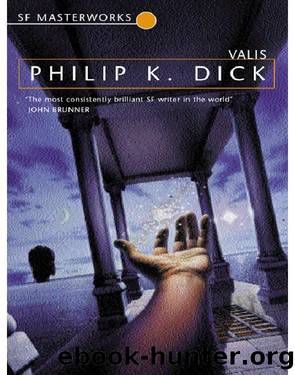VALIS Trilogy - 01 - Valis by Philip K. Dick

Author:Philip K. Dick
Language: eng
Format: mobi
Tags: Science Fiction
ISBN: 9788834712276
Publisher: Fanucci
Published: 2006-08-15T07:00:00+00:00
This is one of the keys to the story of Parsifal, the pure fool who abolishes the delusion of the magician Klingsor and his castle, and heals Amfortas’s wound. But what does it mean?
‘May your suffering be blessed,
Which gave the timid fool
Pity’s highest power
And purest knowledge’s might!’
I don’t know what this means. However, I know that in our case, the pure fool, Horselover Fat, himself had the wound which would not heal, and the pain that goes with it. All right; the wound is caused by the spear which pierced the Savior’s side, and only that same spear can heal it. In the opera, after Amfortas is healed, the shrine is at last opened (it has been closed for a long time) and the Grail is revealed, at which point heavenly voices say:
‘Erlösung dem Erlöser!’
Which is very strange, because it means:
“The Redeemer redeemed!’
In other words, Christ has saved himself. There’s a technical term for this: Salvator salvandus. The ‘saved savior.’
The fact that in the discharge of his task the
eternal messenger must himself assume the lot of
incarnation and cosmic exile, and the further
fact that, at least in the Iranian variety of
the myth, he is in a sense identical with those
he calls – the once lost parts of the divine
self – give rise to the moving idea of the
‘saved savior’ (salvator salvandus).
My source is reputable: The Encyclopedia of Philosophy, Macmillan Publishing Company, New York, 1967; in the article on ‘Gnosticism.’ I am trying to see how this applies to Fat. What is this ‘pity’s highest power?’ In what way does pity’ have the power to heal a wound? And can Fat feel pity for himself and so heal his own wound? Would this, then, make Horselover Fat the Savior himself, the savior saved? That seems to be the idea which Wagner expresses. The savior saved idea is Gnostic in origin. How did it get into Parsifal?
Maybe Fat was searching for himself when he set out in search of the Savior. To heal the wound made by first the death of Gloria and then the death of Sherri. But what in our modern world is the analog for Klingsor’s huge stone castle?
That which Fat calls the Empire? The Black Iron Prison?
Is the Empire ‘which never ended’ an illusion?
The words which Parsifal speaks which cause the huge stone castle – and Klingsor himself – to disappear are:
‘Mit diesem Zeichen bann’ Ich deinen Zauber.’
‘With this sign I abolish your magic’
The sign, of course, is the sign of the Cross. Fat’s Savior is Fat himself, as I already figured out; Zebra is all the selves along the linear time-axis, laminated into one supra- or trans-temporal self which cannot die, and which has come back to save Fat. But I don’t dare tell Fat that he is searching for himself. He is not ready to entertain such a notion, because like the rest of us he seeks an external savior.
‘Pity’s highest power’ is just bullshit. Pity has no power. Fat felt vast pity for Gloria and vast pity for Sherri and it didn’t do a damn bit of good in either case.
Download
This site does not store any files on its server. We only index and link to content provided by other sites. Please contact the content providers to delete copyright contents if any and email us, we'll remove relevant links or contents immediately.
Sita - Warrior of Mithila (Book 2 of the Ram Chandra Series) by Amish(51391)
The Crystal Crypt by Dick Philip K(35676)
Cat's cradle by Kurt Vonnegut(13857)
Always and Forever, Lara Jean by Jenny Han(13620)
Ready Player One by Cline Ernest(12831)
The Last by Hanna Jameson(9217)
Year One by Nora Roberts(8469)
Persepolis Rising by James S. A. Corey(8260)
The remains of the day by Kazuo Ishiguro(7543)
Dark Space: The Second Trilogy (Books 4-6) (Dark Space Trilogies Book 2) by Jasper T. Scott(7366)
Red Rising by Pierce Brown(7318)
Never let me go by Kazuo Ishiguro(7115)
The handmaid's tale by Margaret Atwood(6838)
The Circle by Dave Eggers(6249)
Legacy by Ellery Kane(5943)
The Testaments by Margaret Atwood(5771)
Frank Herbert's Dune Saga Collection: Books 1 - 6 by Frank Herbert(5605)
Pandemic (The Extinction Files Book 1) by A.G. Riddle(5585)
Six Wakes by Mur Lafferty(5192)
